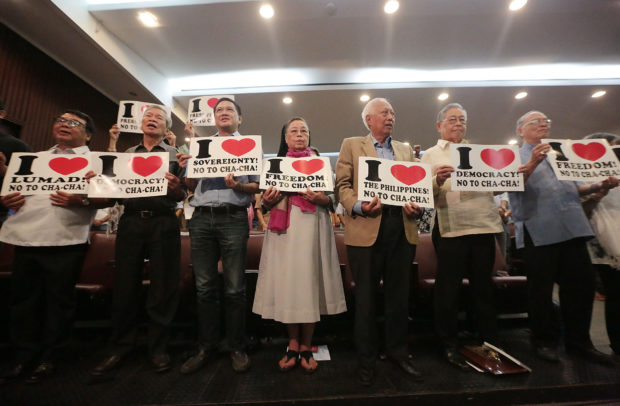‘No to Cha-cha’ coalition launched

LOVE FOR A CAUSE Former lawmakers Neri Colmenares, Satur Ocampo and Lorenzo Tañada III, Sr. Mary John Mananzan, Christian Monsod, retired Chief Justice Hilario Davide Jr. and retired Bishop Deogracias Iñiguez show their opposition to moves to revise the Constitution on Tuesday, a day before Valentine’s Day, at the University of the Philippines in Quezon City. —GRIG C. MONTEGRANDE
At least two framers of the 1987 Constitution are among those leading the charge against the Duterte administration’s moves for Charter change (Cha-cha), which they call “self-serving” and “dangerous.”
During the launch of the “No to Cha-cha” Coalition at the University of the Philippines’ College of Law in Diliman, Quezon City, on Tuesday, 1986 Constitutional Commission members Christian Monsod and former Chief Justice Hilario Davide Jr. defended the fundamental law they helped draft.
They also outlined the dangers of the administration’s plan to amend the Constitution primarily to change the current unitary government to a federal system.
“[This Charter change] is a lethal experiment, a plunge to death, a leap to hell,” Davide said in a speech. “For those who took oaths to uphold and defend the Constitution to now lure people into an unproved federal system is tyranny.”
Proposed revisions
In a statement, the coalition, consisting mostly of members of the multisectoral Movement Against Tyranny, described the proposed amendments at the House of Representatives as “self-serving and dangerous.”
It took exception to the proposed amendments:
• Giving President Duterte authoritarian powers and the option to run again in 2022.
• Extending the terms of incumbent officials, including last-termers, to 2022 and increasing their terms of office thereafter to five years.
• Institutionalizing the pork barrel system.
• Establishing regional states to the benefit of political dynasties.
• Deleting or diluting the nationalist and progressive provisions on the economy, patrimony, sovereignty, social justice and human rights.
The coalition feared the proposed amendments would pave the way for another dictatorship, since some of the changes were intended to delete or water down checks-and-balance systems among the branches of government.
“There is absolutely no need to amend or revise the 1987 Constitution,” Davide said.
The current Charter, he said, is the country’s only one to have “unprecedented permanence,” having remained unamended for 31 years despite two previous attempts at changing it.
“I will not hesitate to assert that the [1987] Constitution, even if not perfect, is the best … for our country and our people, not just for our generations but even generations yet unborn,” Davide said.
It contains, he said, sufficient provisions against abuse of power and guarantees people’s active participation in government, including the use of people power.
Public trust
The former Chief Justice noted that the Philippine Constitution was the only one in the world that institutionalized the principle that “a public office was a public trust.”
“This is a Constitution I’m willing to die for,” he said.
Davide pointed out that the problem was that very few of the provisions had been implemented by way of enabling laws, an observation Monsod backed.
“We have failed in human development not because of the Constitution, but because we have not successfully implemented it,” Davide said. “The Constitution is not the problem, but part of the solution.”
Federalism
Monsod pointed out that if the ruling party’s reasons for proposing federalism was to correct an imbalance of resource distribution from central to regional governments, “Why is there no mention at all of the need for a federal government in their national development plan?”
The perceived problem in fiscal devolution, Monsod said, can be fixed without having to resort to Charter change.
It can be dealt with, for instance, by strictly implementing or amending first the Local Government Code or implementing new legislation, which would be easier to correct than the Constitution.
“Why not start enacting now fiscal decentralization? … Why not enact an antidynasty law to demonstrate sincerity in bringing about real change? Enacting laws against their best interest would be the best way to gain the trust of the people,” he said.
“Why the need for a new Constitution [that] they admit does not directly address the twin problems of poverty and inequality?” he asked rhetorically.
‘Trojan horse’
Monsod wondered whether the proposed shift to federalism was just “a Trojan horse for an authoritarian regime,” noting that the estimated transition period for federalism would end in 2030, during which elected officials in 2019 would get a term of 11 years.
He said he wasn’t against federalism, but emphasized that several prerequisites must be in place first, such as strong political parties to prevent political dynasties.
He also said the government system shift would be better “initiated by regions, from the bottom up.”
The “No to Cha-cha” coalition is planning a rally on Feb. 24, the 32nd anniversary of the Edsa People Power Revolution.